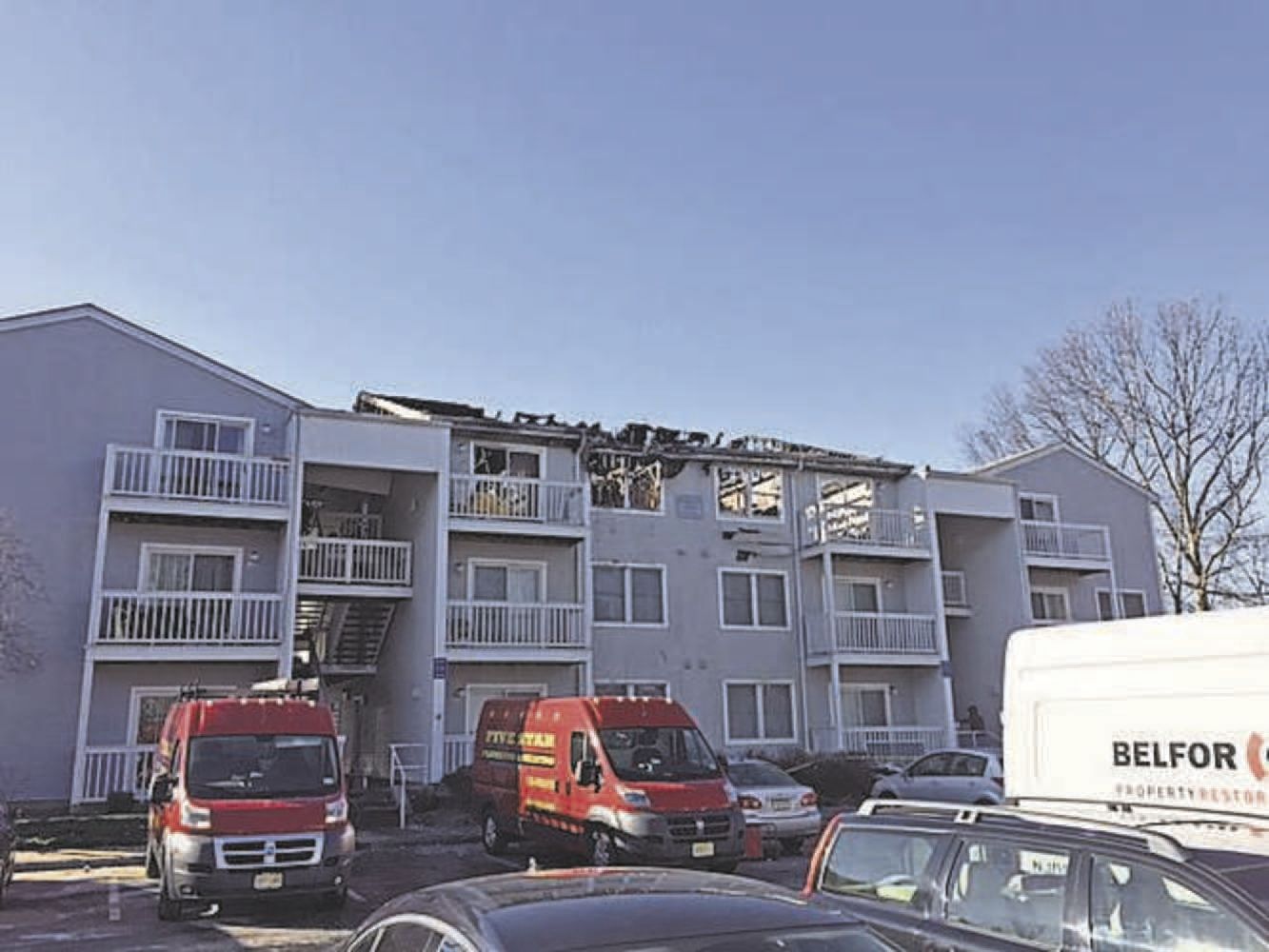By Philip Sean Curran and Lea Kahn, Staff Writers
Johnette Watts recalled being in the shower Wednesday night in her apartment at Griggs Farm when she got out and smelled smoke.
She fled for her life with the clothes on her back, but a fellow tenant was not as fortunate.
Larisa Bartone, 73, never made it out of her apartment and died in a two-alarm blaze that had displaced 35 people. The cause of the fire is under investigation.
Watts, saying she was grateful to be alive, came back Thursday afternoon along with other tenants to retrieve some of their belongings. One woman, who said she spoke no English, walked with a piece of luggage back to the small school bus parked on Billie Ellis Lane, in front of the apartment building she had called home up until Wednesday night.
On bone-chilling day after an equally cold night, the parking lot was slick with ice, while a Princeton Police officer was on the scene. An employee of the municipality could be seen helping an elderly resident back to the bus.
The community was pitching in. Melanie Service, who lives in Griggs Farm but not where the fire broke out, was dropping off supplies in large plastic bags. Municipal government is helping to coordinate donations. Winter clothing, blankets, toiletries, snacks, water and pet food can be dropped off at Trinity Church from now until Jan. 6, between the hours of 9 a.m. and 7 p.m., at the church entrance on Mercer Street, the town said.
Bartone, who lived alone in Apt. 21 at 21 Billie Ellis Lane, was found dead in her apartment, which was on the third floor of the multi-family building, said Robert Gregory, director of the Office of Emergency Management.
The cause of the fire is under investigation, but it is believed that the fire broke out in the victim’s apartment, Gregory said. The building contains 24 apartments, and is one of several buildings in the Griggs Farm development, near the Princeton-Montgomery Township border.
Smoke alarms in the building worked, but Bartone would have had a “better chance to survive” if there had been sprinklers in the building, Gregory said. The Griggs Farm development was completed in 1989, and sprinklers were not required.
The two-alarm fire, which broke through the roof of the three-story building, was brought under control in about 40 to 45 minutes by firefighters who battled the blaze in sub-freezing temperatures, Gregory said.
Volunteer firefighters from the Princeton Fire Department, as well as firefighters from the Montgomery, Lawrence, West Windsor, Plainsboro, South Brunswick and Hopewell volunteer fire departments responded to the fire.
The Princeton Police Department and the Princeton First Aid and Rescue Squad also responded, along with Capital Health Systems paramedics.
While firefighters were battling the flames, some of the 35 residents who were evacuated from the building were shuttled to the courtroom at the Princeton Municipal Building on Witherspoon Street by Princeton University’s Tiger Transit buses.
Some of the victims who were displaced are staying with family or friends, while about a dozen others are staying at the Nassau Inn, Gregory said. It is uncertain at this point if the building will have to be condemned, according to Gregory.
Mayor Liz Lempert said the fire was a “horrible tragedy and our hearts go out to the families affected. Princeton Human Services and the American Red Cross are providing emergency housing to those who have been displaced.
“There is also a Griggs Farm neighbor who has organized an unofficial relief effort. The clubhouse at Griggs Farm is being used as a drop-off point, but I don’t believe a wish list has been provided yet,” Mayor Lempert said.
State Assemblyman Jack Ciattarelli (R-16th Legislative District) said the fire was a tragedy that “possibly could have been prevented” if there had been sprinklers in the multi-family building.
Sprinklers are required in all college dormitories, after a fire killed three students in a Seton Hall University dormitory in 2000. The building did not have sprinklers, but had complied with all other fire codes in effect when it was built. As a result of that fire, New Jersey requires all college dormitories to have sprinklers.
“Where high-density structures are concerned, we need to consider the best kind of policy with respect to sprinkler systems,” Ciattarelli said.
“We have to be careful not to take an overly simplistic approach. There are a great many two- , three- and four-family houses throughout New Jersey for which sprinklers would not be feasible,” he said.
“High-density structures, such as this one, however, are a different animal, requiring urgent attention as to how to prevent fires and loss of life,” Ciatterelli said.

